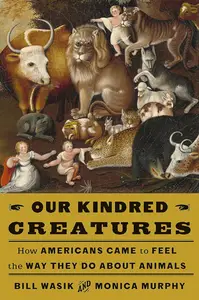- Témaindító
- #1
- Csatlakozás
- 2024.09.10.
- Üzenetek
- 25,854
- Reakció pontszám
- 8
- Díjak
- 5
- Kor
- 37

Free Download Our Kindred Creatures: How Americans Came to Feel the Way They Do About Animals by Bill Wasik, Monica Murphy
English | April 23, 2024 | ISBN: 0525659064 | 464 pages | MOBI | 37 Mb
A compassionate, sweeping history of the transformation in American attitudes toward animals by the best-selling authors of Rabid
Over just a few decades at the end of the nineteenth century, the United States underwent a moral revolution on behalf of animals. Before the Civil War, animals' suffering had rarely been discussed; horses pulling carriages and carts were routinely beaten in public view, and dogs were pitted against each other for entertainment and gambling. But in 1866, a group of activists began a dramatic campaign to change the nation's laws and norms, and by the century's end, most Americans had adopted a very different way of thinking and feeling about the animals in their midst.
In OurKindred Creatures, Bill Wasik, editorial director of The New York Times Magazine, and veterinarian Monica Murphy offer a fascinating history of this crusade and the battles it sparked in American life.On the side of reform were such leaders as George Angell, the inspirational head of Massachusetts's animal-welfare society and the American
In recounting this remarkable period of moral transition-which, by the turn of the twentieth century, would give birth to the attitudes we hold toward animals today-Wasik and Murphy challenge us to consider the obligations we still have to all our kindred creatures.
Buy Premium From My Links To Get Resumable Support,Max Speed & Support Me
Code:
⚠
A kód megtekintéséhez jelentkezz be.
Please log in to view the code.
